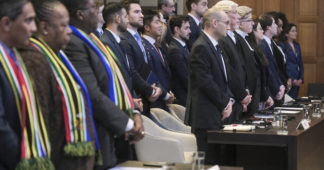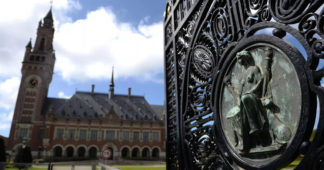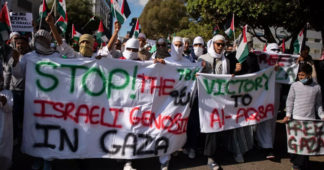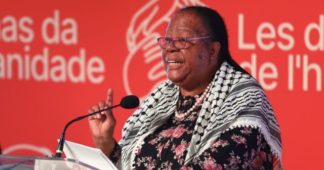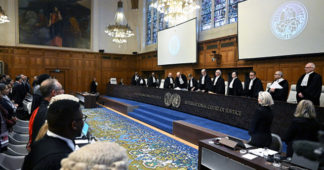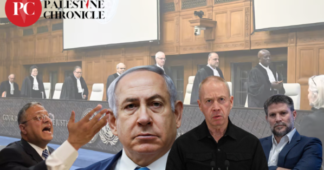Jean-Luc Mélenchon was at the International Court of Justice yesterday to hear South Africa’s case against Israeli genocide. He argues it’s had one success already: bringing international law to bear on an Israel that only recognizes the law of the strongest.
By Jean-Luc Mélenchon
01.12.2024
What South Africa is saying is that, more than a series of war crimes, we’re dealing with something qualitatively different. As a signatory to the Convention on the Prevention and Punishment of the Crime of Genocide, it’s saying there is a question of genocide. I’ll leave aside the purely legal considerations for the moment and stick to that. So, why is this a great moment? Because it’s the return of humanity. We only see this one human people through international law, through collective action.
International law may be imperfect. But at least it exists and here we are in a place to have an argument, a counterargument, and judgment, which must then be respected. Everyone knows that if this court concludes that, indeed, there are acts that present the risk of genocide, then obviously this would completely change the political and legal situation for all those who are somehow helping the government of Israel in its military operation in Gaza.
There’s a point that needs to be understood, whose subtleties I wasn’t aware of before I got here. The essential question before the court is, basically, is this genocide or not? But that’s not what the court has to decide right now. That broader question will be judged on its merits, and that will take time. But right now, the court is ruling on the request for “provisional measures” [to prevent genocide, which would require immediate action, perhaps including a cease-fire].
That’s why we should first of all give a million thanks to the South African government for taking this initiative. As one of the representatives of a country that hasn’t made this request, I can assure you that I don’t feel very proud of it right now. The convention on genocide was also signed by France: the way it works is that the signatories can take action and call another convention signatory to account for its actions.
So, what the court has to rule on is whether it takes the provisional measures requested by South Africa for the benefit of the Palestinians and the population of Gaza. If there are factors that suggest that this is going to end in genocide, then the court has the competence to say “stop” and take a decision. It wouldn’t be the first time, and this isn’t a special case. The court has already ruled on similar cases where there was the same accusation of genocide, for example the [genocide against the] Rohingya peoples. Several such instances were cited in the magnificent case that South Africa presented this morning. The decision will be taken quickly, since these are provisional measures against a massacre with irreparable consequences.
Many documents have been added to the dossier, and the experts here, the activists here, are all aware of the number of deaths, the relentlessness of the Israeli assault. What especially struck me was how much the Israeli authorities have themselves used the language of genocide. You can see the violence of their comments. They were made in particular by Netanyahu, but also by his minister of justice, his minister of the armed forces, and the chief of the armed forces. It isn’t just that one person, in a moment of emotion, made remarks of a genocidal nature. If I were a religious man, I’d be shocked to hear Netanyahu use the Bible to recommend slaughtering everyone.
So, there were a lot of quotations, a lot of examples given that showed that on the basis of these incitements at the top of the state, and even among the troops, individually, people felt invested with a genocidal mission — saying, we must kill them all, that there are no innocents, including the women and the children. This was a really powerful moment.
For me, having seen this unbridled violence going on for such a long time, when you come into a legal setting it’s almost a moment of reconciliation with humanity. All of a sudden, you’re dealing again with a human people whose rights are guaranteed. Maybe that’s not going to be the immediate result, but it means so much. And we have no other choice. If we don’t want the law of the strongest, then we need international law. That’s why the Palestinian cause was so brilliantly defended this morning, because we started from proven, documented facts. Afterward, the court will judge how proven they are, but they were facts.
This wasn’t a matter of ideological speeches, though there was a certain commitment on the part of South Africa, which took the history of this moment back not to October 7, but to the beginning, to the end of World War II. Here in the court, everyone spoke in the terms of international law, the United Nations, the positions taken by the secretary-general. In short, we were on a well-trodden path. I think that for us, this is a real strong point to base ourselves on, because it enables us to establish the consistency of certain political principles. It’s not like one day we’re of such and such a point of view, and then the next day, faced with a similar situation, we refuse to see anything. That’s what “campism” is: the logic where because you’re aligned to such and such camp, you simply fall in behind the leader.
My position, and that of La France Insoumise, is nonalignment. That does not mean withdrawing into a comfortable position of equidistance or neutrality. Rather, it’s about being committed to principles that remain consistent, whoever the actors involved may be. So, all war crimes must be condemned. As one of the lawyers put it very strongly at one point: whatever the reason, whatever the opposing side may be accused of, whatever the situation, and whether we are at peace or at war, nothing justifies genocide. Never, under any circumstances.
The role of a civilized country, especially one that has signed conventions, is to respect its own word and the commitments it has made. I think that what is being said here, if it is widely disseminated, will encourage a lot of people to take a stand. Because one of the most brilliant arguments I heard in the courtroom was about doctors who, before leaving a hospital, wrote on a blackboard “We did what we could. Remember us.” And the lawyer said “Who’s going to be able to look themselves in the mirror tomorrow? Because whatever the day’s events, the ups and downs, we all know where we stand and we know it’s a massacre. Not a ‘disproportionate’ massacre: that word doesn’t fit. For no massacre is proportionate, no genocide is proportionate.”
So, I think that the moral condemnation contained in this situation has real force. I’m asking all those who share my convictions, my commitment, to get involved. Take part in demonstrations, sign petitions, follow the historic leaders of this movement, of which I am not one. There are people like Salah Hamouri, just like others who have always been militants in this cause. And listen. Everything they say matters, because it helps you form your own convictions and educate yourselves. We can never be educated enough about international law and respect for peace between nations. Right now, we know that this trial has already had a first result, in the statements made by both Israeli and US spokespersons. Even if we don’t believe in their sincerity, they have been forced to stop saying the things they were saying at the beginning of this story.
So, I think that’s already a first result. But beyond that, this court hearing took place. That itself is a victory for humanity, against the law of the strongest.
We remind our readers that publication of articles on our site does not mean that we agree with what is written. Our policy is to publish anything which we consider of interest, so as to assist our readers in forming their opinions. Sometimes we even publish articles with which we totally disagree, since we believe it is important for our readers to be informed on as wide a spectrum of views as possible.
